Taunton
| Taunton | |
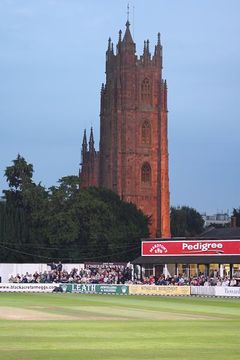 The tower of St. James Church rises over the County Ground |
|
 Taunton
|
|
| Population | 61,400 [1] |
|---|---|
| OS grid reference | |
| District | Taunton Deane |
| Shire county | Somerset |
| Region | South West |
| Country | England |
| Sovereign state | United Kingdom |
| Post town | TAUNTON |
| Postcode district | TA1, TA2, TA3, TA4 |
| Dialling code | 01823 |
| Police | Avon and Somerset |
| Fire | Devon and Somerset |
| Ambulance | South Western |
| EU Parliament | South West England |
| UK Parliament | Taunton Deane |
| Website | www.tauntondeane.gov.uk |
| List of places: UK • England • Somerset | |
Taunton is the county town of Somerset, England. The town, including its suburbs, had an estimated population of 61,400 in 2001.[1] It is the largest town in the shire county of Somerset.
The town has over 1,000 years of religious and military history, and is now undergoing a regeneration project. It has various transport links which support its central role in economy and commerce.
Taunton is the site of Musgrove Park Hospital and Somerset County Cricket Club's County Ground and is home to 40 Commando, Royal Marines. Central Taunton is part of the annual West Country Carnival circuit. It hosts the Taunton flower show, which has been held in Vivary Park since 1866. The United Kingdom Hydrographic Office is located on Admiralty Way.[2]
Contents |
History

The town name derives from "Town on the River Tone" — or Tone Town.[3][4] There was a Romano-British village near the suburb of Holway,[5] and Taunton was a place of considerable importance in Saxon times.[6] The Saxon town was a burh with its own mint.[4] King Ine of Wessex threw up an earthen castle here about 700, but destroyed by his queen Æthelburg of Wessex in 722, to prevent its seizure by rebels.[4]
A monastery was founded before 904.[7] The bishops of Winchester owned the manor, and obtained the first charter for their "men of Taunton" from King Edward in 904, freeing them from all royal and county tribute. At some time before the Domesday Survey Taunton had become a borough with very considerable privileges, and a population of around 1,500[6] and 64 burgesses,[4] governed by a portreeve appointed by the bishops. Somerton took over from Ilchester as the county town in the late thirteenth century,[8] but it declined in importance and the status of county town transferred to Taunton about 1366.[9] Between 1209 and 1311 the manor of Taunton, which was owned by the Bishop of Winchester, increased two and a half times.[10]
In 1451 during the Wars of the Roses Taunton was the scene of a skirmish between Thomas de Courtenay, 13th Earl of Devon and Baron Bonville.[4] Queen Margaret and her troops passed through in 1471 to defeat at the Battle of Tewkesbury.[4] In the Second Cornish Uprising of 1497 most of the Cornish gentry supported Perkin Warbeck's cause and on 17 September a Cornish army some 6,000 strong entered Exeter before advancing on Taunton.[4][11] Henry VII sent his chief general, Giles, Lord Daubeney to attack the Cornish and when Warbeck heard that the King's scouts were at Glastonbury he panicked and deserted his army. Henry VII reached Taunton on 4 October 1497 were he received the surrender of the remaining Cornish army. The ringleaders were executed and others fined a total of £13,000.[12]
Taunton Castle changed hands several times during the Civil War of 1642-45 but only along with the town.[13] During the Siege of Taunton it was defended by Robert Blake, from July 1644 to July 1645, with the town suffering destruction of many of the medieval and Tudor buildings.[4] After the war, in 1662, the keep was demolished and only the base remains.[14] On 20 June 1685 the Duke of Monmouth crowned himself king of England at Taunton during the Monmouth Rebellion and in the autumn of that year Judge Jeffreys was based in the town during the Bloody Assizes that followed the Battle of Sedgemoor.[15]
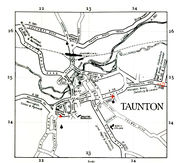
The town did not obtain a charter of incorporation until 1627,[6] which was renewed in 1677. The charter lapsed in 1792 owing to vacancies for the members of the corporate body, and Taunton was not reincorporated until 1877. The medieval fairs and markets of Taunton (it still holds a weekly market today), were celebrated for the sale of woollen cloth called "Tauntons" made in the town. On the decline of the west of England woollen industry, silk-weaving was introduced at the end of the 18th century.[16]
In 1839 the Grand Western Canal reached Taunton aiding trade to the south,[17] which was further enhanced by the arrival of the railway in 1842.[4]
In World War II the Bridgwater and Taunton Canal formed part of the Taunton Stop Line, designed to prevent the advance of a German invasion. Pillboxes can still be seen along its length.[18]
Regeneration
In 2006, Taunton Deane council revealed plans which it called "Project Taunton". This would see the regeneration of areas such as Firepool, Tangier, aiming to create Taunton as a central hub for business in the South West. The project has identified four areas for regeneration.[19]
The Firepool area on the northern edge of Taunton town centre, adjacent to the main line railway station, currently includes a high proportion of vacant or undeveloped land. The Council is currently promoting a sustainable, high quality, employment-led mixed use development. In Firepool, the area near Taunton railway station and the County Cricket Ground, are plans to develop high rise offices and small retail outlets in an effort to establish Taunton as a sustainable business district in the South West. Furthermore, plans include to build hundreds of riverside flats. The Firepool project is set to attract 3000 new jobs and 500 new homes. These are intended to create more than 2,000 new homes in the town centre, at least 14,000 new homes across the whole of Taunton, 80,000 square metres (20 acres) of employment space, 50,000 square metres (12 acres) of new retail space and at least 7,000 jobs.[20] In Tangier, the area near the Somerset College of Arts and Technology, the project proposes to build smaller offices and more riverside housing. What has been described as the "Cultural Quarter", is the area along the river between Firepool and Tangier.[19] The proposals have plans to extend riverside retail, an aim to attract more smaller, boutique businesses, such as those already found in the Riverside shopping centre. Finally, there are plans to extend the town centre's shopping district by 50% to attract more major retail businesses. Moreover, there are plans to redevelop Goodlands Park in to a more desirable park to compliment the major redevelopment plans. The plans also include replacing Taunton Library in 2011.[19]
The regeneration programme will also include better transport links, with two more park and rides to be established. At present, the Firepool project is scheduled to be completed by early 2018 and the other areas by 2014, however it is anticipated that much of the major changes will be completed by 2012. Work has already begun. For instance, construction work has already begun to create desirable riverside housing in Firepool and Taunton Livestock Market has moved to the outskirts to make way for major redevelopment.[19]
Governance
Taunton includes an area named Holway which was once a village in its own right. Holway was originally one of the Five Hundreds of Taunton Dean, the Infaring division or district of the three districts that made up Taunton Dean.[21] The parish of Staplegrove is situated in the northern suburbs of Taunton. The parish, largely built by Monsell Youell Construction Ltd in the 1970s, has a population of 1,889.[22]
Borough Council
Taunton is the main settlement and administrative centre of the local government district of Taunton Deane. The district was formed on 1 April 1974, under the Local Government Act 1972, by a merger of the municipal borough of Taunton, Wellington urban district, Taunton Rural District, and Wellington Rural District. Taunton Deane was granted borough status in 1975, perpetuating the mayoralty of Taunton.[23] The district was given the name of an alternate form of the Taunton hundred.
Taunton Deane Borough Council consists of 55 councillors, of whom 20 are elected for wards in the town of Taunton. The wards are: Blackbrook & Holway; Eastgate; Fairwater; Halcon; Lyngford; Manor & Wilton and Pyrland & Rowbarton. Eastgate ward returns two councillors, with the remaining wards each returning three. At the council elections in May 2007, 17 Liberal Democrats were elected and 3 members of the Conservative Party.[24]
County Council
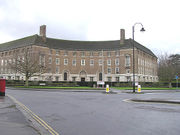
Somerset County Council is based at County Hall in Taunton, and consists of 58 councillors. The town of Taunton is included in six electoral divisions, each returning a single county councillor: Taunton East; Taunton Fairwater; Taunton North; Taunton South; Taunton West and Taunton and Trull (which also includes rural areas). Five councillors are members of the Liberal Democrats, and one is a Conservative.[25]
United Kingdom Parliament
Taunton Deane is a county constituency represented in the House of Commons of the Parliament of the United Kingdom. It elects one Member of Parliament (MP) by the first past the post system of election. It is based on the town of Taunton but extends to include Wellington, many small villages and parts of Exmoor. The current MP is Jeremy Browne, a member of the Liberal Democrats.[26]
European Parliament
Residents of Taunton also form part of the electorate for the South West England constituency for elections to the European Parliament.[27]
Geography
Taunton lies on the River Tone between the Quantock, Blackdown and Brendon hills in an area known as the Vale of Taunton.
Geology
In the Taunton area Permian (295–250 million years ago) red sandstones and breccia outcrop, while rocks of Triassic age (248–204 million years ago) underlie much of Somerset and form the solid geology to the Somerset Moors and Levels.[28]
Nature reserves
There are several Local Nature Reserves in and around Taunton, which are protected under a statutory designation in Section 21 of the National Parks and Access to the Countryside Act 1949. South Taunton Streams is an urban wetland,[29] and in the northern suburbs is the Children's Wood riverside reserve which provides a movement corridor for various animals including Otters along the banks of the River Tone. Birds occurring at the site include: Kingfisher, Dipper, Grey Wagtail, Mute Swan, Grey Heron and Reed Warbler. It is also home to butterflies such as the small and Large Skipper, Marbled White, Small Heath and Small Copper, and to dragonflies and damselflies.[30]
Climate
Along with the rest of South West England, Taunton has a temperate climate which is generally wetter and milder than the rest of the country. The annual mean temperature is approximately 10 °C (50.0 °F) and shows a seasonal and a diurnal variation, but due to the modifying effect of the sea the range is less than in most other parts of the UK. January is the coldest month with mean minimum temperatures between 1 °C (33.8 °F) and 2 °C (35.6 °F). July and August are the warmest months in the region with mean daily maxima around 21 °C (69.8 °F).[31]
The south-west of England has a favoured location with respect to the Azores high pressure when it extends its influence north-eastwards towards the UK, particularly in summer. Convective cloud often forms inland however, especially near hills, reducing the number of hours of sunshine. The average annual sunshine totals around 1,600 hours.[31]
Rainfall tends to be associated with Atlantic depressions or with convection. The Atlantic depressions are more vigorous in autumn and winter and most of the rain which falls in those seasons in the south-west is from this source. Average rainfall is around 31–35 inches (787–889 mm). About 8–15 days of snowfall is typical. November to March have the highest mean wind speeds, with June to August having the lightest winds. The predominant wind direction is from the south-west.[31]
|
||||||||||||||||||||||||||||||||||||||||||||||||||||||||||||||||||||||||||||||||||||||
Demography
| Population Profile[32] | |||||
|---|---|---|---|---|---|
| UK Census 2001 | Taunton Deane | South West England | England | ||
| Total population | 102,299 | 4,928,434 | 49,138,831 | ||
| Foreign born | 4.1% | 9.4% | 9.2% | ||
| White | 98.4% | 97.7% | 91% | ||
| Asian | 0.4% | 0.7% | 4.6% | ||
| Black | 0.2% | 0.4% | 2.3% | ||
| Christian | 75.9% | 74.0% | 72% | ||
| Muslim | 0.3% | 0.5% | 3.1% | ||
| Hindu | 0.1% | 0.2% | 1.1% | ||
| No religion | 15.7% | 16.8% | 15% | ||
| Over 75 years old | 9.5% | 9.3% | 7.5% | ||
| Unemployed | 2.4% | 2.6% | 3.3% | ||
The town of Taunton (which for population estimates includes the unparished area – or former municipal borough – plus the neighbouring parishes of Bishop's Hull, Comeytrowe, Norton Fitzwarren, Staplegrove, Trull and West Monkton) had an estimated population of 61,400 in 2001.[1] It is the largest town in the shire county of Somerset.
Taunton forms part of the larger borough of Taunton Deane which also includes the town of Wellington and surrounding villages. Taunton Deane had an estimated population of 103,700 in 2002.[22]
The figures below are for the Taunton Deane area.
| Population since 1801 - Source: A Vision of Britain through Time | |||||||||||||
| Year | 1801 | 1851 | 1901 | 1911 | 1921 | 1931 | 1941 | 1951 | 1961 | 1971 | 1981 | 1991 | 2001 |
|---|---|---|---|---|---|---|---|---|---|---|---|---|---|
| Population Taunton Deane[33] | 33,139 | 51,844 | 53,759 | 55,666 | 56,161 | 56,661 | 62,745 | 69,492 | 75,320 | 81,639 | 84,795 | 95,791 | 102,304 |
Economy
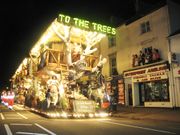
Taunton Deane had a low unemployment rate of 4.1% compared with the national average of 5.0% in 2005.[34]
Taunton is home to the United Kingdom Hydrographic Office (UKHO) which is an organisation within the Ministry of Defence responsible for providing navigational and other hydrographic information for national, civil and defence requirements. The UKHO is located on Admiralty Way and has a workforce of approximately 850 staff. At the start of the Second World War chart printing moved to Taunton but the main office did not move until 1968.[35]
The Avimo company, which made precision instruments in Taunton, became part of Thales Optics in 2001, however their manufacturing is no longer in Taunton having been transferred along with a number of staff to Glasgow and Wells.[36][37] Taunton is also home to the one of the head offices of Debenhams,[38] Western Provident Association, Viridor and CANDAC.
Moreover, the town is home to a Defra regional office at Quantock House on Paul St, the Charity Commission for England and Wales,[39] General Electric, Screwfix. Taunton is also famous for the production of cider.[40]
Landmarks
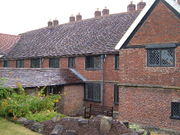
Gray's Almshouses on East Street were founded by Robert Gray in 1615 for poor single women.[41] The red brick buildings bear the arms of Robert Gray, dated 1635, and another arms of the Merchant Tailors. A small room is used as chapel and has original benches and a painted ceiling. It has been designated by English Heritage as a grade I listed building.[42] St Margaret's Almshouses was founded as a leper colony in the 12th century. Glastonbury Abbey acquired the patronage of the hospital in the late 13th century and rebuilt it as almshouses in the early 16th century. From 1612 to 1938 the building continued to be used as almshouses, cared for by a local parish. In the late 1930s it was converted into a hall of offices for the Rural Community Council and accommodation for the Somerset Guild of Craftsmen. It later fell into disrepair until the Somerset Buildings Preservation Trust with Falcon Rural Housing purchased and restored it for use as four dwellings of social housing. It is a grade II* listed building.[43]
The grounds of Taunton Castle[44] include the Somerset County Museum and The Castle Hotel, which incorporates the Castle Bow archway. Together with the municipal buildings they form a three-sided group of buildings just beyond the Castle Bow archway from Fore Street. The centre of the square is used as a car park, and a plain brick edifice of Mecca Bingo hall makes up the west side of it.
The Tudor Tavern (now a branch of Caffè Nero) in Fore Street dates from 1578.[45]
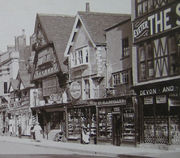
The area by the river north of the centre is surrounded by Morrisons supermarket, retirement housing and the Brewhouse Theatre. Towards the centre, is the Dellers Wharf Nightclub, Bridge Street and Goodlands Gardens. Currently a regeneration programme is being executed, north of Bridge Street, which will include redeveloping the County Cricket Ground. The area has hosted a concert by Elton John in 2006.
Shopping
Hankridge Farm is a retail park close to the M5 motorway, with large stores including PC World and Halfords. In addition, there is a 'Venue' on the park, with restaurants, the Odeon cinema and Hollywood Bowl bowling. Now known as Riverside Retail Park.
The Old Market was a farmers market and took place on the Parade in front of Market House but this eventually moved to the Firepool area, although cattle trading on the site ceased in 2008.[46] A large indoor shopping centre to the East of the Parade was built on a site which had, at one time been a Pig Market. Although its official name is Old Market Centre, locals refer to it as "The Pig Market" as one operated on the site from 1614 to 1882.[47]
The County Walk is an indoor shopping complex in the centre with an anchor supermarket, Sainsbury's.
Public parks
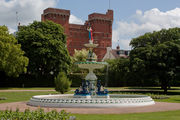
There are a number of public parks around Taunton including Vivary Park, Goodlands Park and Victoria Park. The most notable is Vivary Park, located on land that was formerly a medieval fish farm, or vivarium, for Taunton Priory and Taunton Castle.[48] Fronted by a pair of cast iron gates made by the Saracen Foundry of Glasgow,[49] it contains the Sherford Stream, a tributary of the River Tone, which flows through the 7.5 hectares (19 acres) park,[50] which is located near the centre of the town. It contains two main wide open spaces, as well as a war memorial dating from 1922, a miniature golf course, tennis courts, two children's playgrounds, a model railway track which was added in 1979, and an 18-hole, 4620-yards, par-63 golf course.[51] The park includes trees, rose beds and herbaceous borders, with around 56,000 spring and summer bedding plants being used each year.[50] The rose garden includes the Royal National Rose Society Provincial Trial Ground.[48] Taunton Flower Show has been held annually in the park since the 19th century.[52] It has been described as "The Chelsea of the West",[53] and attracts around 24,000 visitors over its two days.[54] Goodlands Gardens, located in the centre of the town, is behind the Debenhams department store and The Castle Hotel.
Transport
Rail
Taunton railway station is on the London to Penzance Line and the Cross-Country Route. It is served and operated by First Great Western and served by CrossCountry, with services to Manchester, Birmingham,[55] Cardiff, Bristol,[56] London, Exeter, Plymouth and Penzance, as well as the rest of the West Country.[57] There are generally one fast and one slow trains each hour to both Bristol Temple Meads and Exeter St Davids and one train to London Paddington.
The former railway route to Minehead has is now a heritage railway known as the West Somerset Railway.[58]
In 2009, Project Taunton,[59] the authority responsible for Taunton's major regeneration project, revealed plans for Taunton metro rail, as part of their transport sustainability plan.
Road
Taunton also has good road links, having the M5 motorway junctions 25 (Taunton) and 26 (Wellington) close to the town, as well as other major roads such as the A38 and A358. Taunton Deane services are located between junctions 25 and 26 on the M5. However, with the flourishing local economy, traffic is a problem with Somerset County Council giving a prediction of 300-400% increase based on 2001 levels.
Buses and coaches
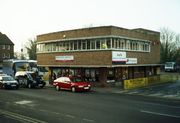
Local bus services in Taunton's zone 1 and 2 services are provided by First Avon and Somerset. Local bus services are frequent, with peak time services running as frequent as every 4–9 minutes.
Webberbus runs Service 15 and 18. 15 is an express service connecting Burnham on Sea with Taunton via Bridgwater, calling at stops including Taunton railway station, Park Street, Musgrove Park Hospital and Somerset College. 18 is a service from Minehead to Taunton, similar to that of First's X28 service.
Taunton Coach Station's operators include National Express, whom run regular London and Heathrow coaches. Local coach operator Berrys of Taunton, runs a number of day excursions and offers the London Superfast service from the Taunton and the West County to London every day.
Cooks Coaches operate two Park and Ride schemes into the town centre known as the Taunton Flyer. One operates from Silk Mills park and ride site in Silk Mills Road to the west of the town. The other from Taunton Gateway park and ride site, close to Junction 25 of the M5 to the east of the town.[60]
Air
The nearest airports are Exeter and Bristol, both within 40 miles of Taunton[61][62]
Trams
The Taunton tramway was opened on 21 August 1901. Six double deck cars operated on the 3 ft 6 in (1,067 mm) gauge line between the railway station and East Reach where the depot was situated. In 1905 the service was withdrawn for two months while the track was improved; the cars were replaced at the same time by six single deck cars and the old double deckers were sold to Leamington Spa. A short extension beyond the station to Rowbarton was opened in 1909 making the line 1.66 miles (2.7 km) long. The price of its electricity was due to increase in 1928 which the company refused to pay so it offered to sell out but this was not accepted. The electricity was cut off on 28 May 1921 and so the system closed.[63][64]
Education
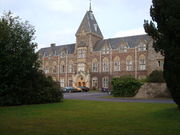
State secondary schools in Taunton include The Castle School, The St Augustine of Canterbury School, Heathfield Community School, Bishop Fox's Community School and Ladymead Community School. State-funded Sixth Form teaching is provided by Richard Huish College. Both Heathfield Community School and The Castle School have or are developing Sixth Forms as an extension to the schools. Heathfield's Sixth Form, named "The Space" (which opened in September 2009) specialises in Performing Arts. Castle's Sixth Form, named Qdos (Opening in September 2010) specialises in Sport. The coeducational independent schools in Taunton are Queen's College, King's College and Taunton School. Further education is provided by Somerset College of Arts and Technology.
In March 2009, it was announced that Jim Knight, Minister of State for Schools and Families, had approved plans that would mean the closure of both Ladymead and nearby St Augustine of Canterbury.[65] The schools are to close in July 2010, to be replaced in September by The Taunton Academy.[66]
Health Services
Taunton is within Somerset Primary Care Trust and is home to Musgrove Park Hospital, within Taunton and Somerset Foundation NHS Trust. This is one of two district hospitals within Somerset alongside Yeovil District Hospital. A Nuffield Hospital is also situated within the town, run privately by Nuffield Health. The town is also home to several doctor's surgeries as well as a family planning clinic and occupational health centre.[67][68]
Religious sites
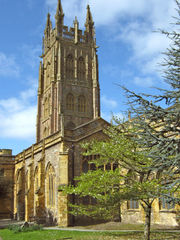
The Mary Street Unitarian Chapel, which dates from 1721,[69] is located on Mary Street in Taunton. Samuel Taylor Coleridge, while living Nether Stowey 16 miles (26 km) away, came to the chapel to preach on several occasions. Dr. Malachi Blake, who founded the Taunton and Somerset Hospital in East Reach, Taunton, was also a preacher at the chapel, attending in 1809 in celebration of the fiftieth year of George the Third's reign. The Chapel still has the original interior including Flemish oak pillars in the Corinthian style. The pews and pulpit are also in oak, and there is an early 18th century candelabra.
In the latter part of the 17th century, Taunton had two dissenting places of worship: "Paul's Meeting" and the Baptist Meeting.[70] Paul's Meeting was built at the top of Paul Street soon after 1672 on part of a bowling green behind the Three Cups Inn, now The County Hotel, and rapidly became one of the largest congregations in the county. After Mayor Timewell sacked both Paul's Meeting and the Baptist Meeting in 1683, the dissenters were driven to worship in private houses on the outskirts of Taunton, where their assemblies were regularly raided by the Justices. Paul's Meeting survived attempts to turn it into a workhouse and, with the coming of William and Mary, followed by the Toleration Act of 1689, was reopened. The Baptist Meeting became the Baptist New Meeting was registered in 1691 and rebuilt in 1721 as Mary Street Chapel.[71]
The Parish church of St. Mary Magdalene, built of sandstone more in the South Somerset style, preserves an attractive painted interior, but its most notable aspect is its 15th and 16th century tower (rebuilt in the mid-19th century), which is one of the best examples in the country and a 163 feet (50 m) tall landmark.[72][73] It was described by Simon Jenkins, an acknowledged authority on English churches, as "the finest in England. It makes its peace with the sky not just with a coronet but with the entire crown jewels cast in red-brown stone."[74] The tower itself has 12 bells and 3 bells "hung dead" for the clock mechanism.[75]
The Parish church of St. James is also located near the centre of Taunton quite close to St. Mary Magdalene. The oldest parts of St. James Church are early 14th century and there are fragments of 15th century glass in the West end. Like St. Mary's it also has a sandstone tower but built to a much less impressive design. The tower was also like St. Mary's rebuilt in the 19th century – in this case thought to be due to building defects in the original tower.[76] The church backs onto the County Ground and forms a familiar backdrop to the popular Cricket ground.
The church of St John was built in 1864 to designs by Sir George Gilbert Scott.[77]
Popular culture references
Taunton is mentioned in The Remains of the Day by Kazuo Ishiguro,[78] Tinker, Tailor, Soldier, Spy by John le Carre [79] and was given the fictitious name of "Toneborough" by Thomas Hardy.[80]
Taunton also features in So Long, and Thanks for All the Fish by Douglas Adams part of The Hitchhiker's Guide to the Galaxy series of books.[81]
Comedian Bill Bailey mentions the town in his stand-up DVD Part Troll, claiming to have taken part in a teleportation experiment sponsored by Taunton Cider.[82]
Sport
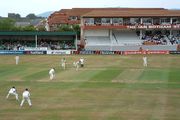
Taunton is home to a number of sport clubs and venues.
The County Ground was originally home to Taunton Cricket Club, which was formed in 1829 and played at The County Ground until 1977 before moving to Moorfields, Taunton in conjunction with Taunton Vale Hockey Club, after which it was solely used by Somerset County Cricket Club.[83] Somerset CCC was formed in 1875, but the club did not achieve first class status until 1891.[84] The County Ground has a capacity of 6,500 and the ends are called the River End and the Old Pavilion End,[85] and one of the main stands is named after Ian Botham. The ground houses the Somerset County Cricket shop and museum, which also has various conference rooms. It is the current home of the England women's cricket team.
Taunton Town F.C. are a football club, who play at Wordsworth Drive in the town.[86] They were formed in 1947 by a few local businessmen as Taunton F.C., changing to the current name in 1968, and played their first friendly fixture in 1948. For most of their history, Taunton were members of the Western League. They spent a six-season spell in the Southern League from 1977, and after a further period in the Western League, returned to the Southern League in 2002, after winning the FA Vase in 2001.[87] After the latest re-organisation of the English football league system, the club are currently members of the Southern League Division One South & West.
Somerset Vikings are a Rugby League Club who were formed at the beginning of 2003 as part of the RFL's plans to develop the game further beyond the traditional areas in the north of England. Initially the side was made up of a mixture of Royal Marines based in Taunton and Exeter together with a number of local rugby union players keen to try the 13-man code. The Vikings play at Hyde Park which is the home of the Taunton Rugby union club, which was formed in 1874.[88]
The Taunton Tigers is a semi-professional basketball team competing in the English Basketball League Men's Division 1. The team play all their home games at Wellsprings Leisure Centre, which has a capacity of 500 seats.[89]
Taunton Racecourse is close to the Blackdown Hills and about 2 miles (3 km) from the centre of Taunton. Although racing had been held in the area previously, the first race at the present site was held on 21 September 1927. The stands are called the Orchard Stand and the Paddock Stand which provide catering facilities and are used for meetings and conferences on days when racing is not taking place.[90]
There is an oval motor racing circuit at Smeatharpe which is close to the Somerset/Devon border, it is frequently referred to as the Taunton Banger racing circuit although it is around 11 miles from central Taunton.[91]
Taunton Freeriders is a community mountain bike project in partnership with the Forestry Commission who are developing a series of northshore and downhill (DH) style mountain bike trails just outside of the town. Run by volunteers from the local close-knit riding community and funded solely by kind donations, they are also involved with the redevelopment of the "Norton Dirt Jumps" and campaigning for a replacement skatepark at Hamilton Park and better facilities for alternative sports (e.g. BMX, skateboard, in-line skates, mountain biking, parkour among others).[92][93]
Notable residents
The following people were born or have lived in Taunton:
- Joseph Alleine - (1634–1668). English Puritan Nonconformist pastor and author.[94]
- Colin Addison - former professional footballer and manager. Born in Taunton 8 May 1940.[95]
- Jenny Agutter - actress. Born in Taunton 20 December 1952.[96]
- William Larkins Bernard - architect (1 October 1843 – 22 July 1922). Born in Taunton.[97]
- Pattie Boyd - Actress and model, born 17 March 1944. Former wife of both George Harrison and Eric Clapton.[98]
- Andrew Caddick - cricketer. Born in New Zealand 21 November 1968, spent professional career at Somerset County Cricket Club in Taunton.[99]
- Arthur C Clarke - science fiction author and inventor (16 December 1917 – 19 March 2008). Attended Richard Huish College, Taunton.[100]
- Alexander William Kinglake - barrister, travel writer and historian (5 August 1809 – 2 January 1891). Born at Wilton House near Taunton.[101]
- Karoline Leach - British writer and playwright, best known for her revision of Lewis Carroll's biography.
- Lee Martin - footballer who plays for Ipswich Town. Born in Taunton 9 February 1987.[102]
- Deborah Meaden - business mogul, philanthropist, star of T.V series Dragons Den. Born in Taunton 11 February 1959.[103]
- Alfred B. Mullett - architect to Abraham Lincoln. Born in Taunton (April 7, 1834 – October 20, 1890).[104]
- James Purefoy - actor, one of the stars of the joint HBO-BBC series, Rome. Born in Taunton 3 June 1964.[105]
- Gary Rhodes - celebrity chef who was head chef at The Castle Hotel from 1986 – 1990.[106]
- Viv Richards - former West Indies cricketer. Born in Antigua, resident in Taunton while playing for Somerset 1974–1986.[107]
- Andy Robinson - former England rugby union international and head coach. Now head coach of Scotland. Born in Taunton 3 April 1964[108]
- Miranda Shearer - author. Born in Taunton 11 May 1982, but resident of Spaxton and later Over Stowey.[109]
- Hugh Trenchard, 1st Viscount Trenchard - Military officer involved in establishment of Royal Air Force (3 February 1873 – 10 February 1956). Born in Taunton.[110]
- Marcus Trescothick - England cricketer, given Taunton Deane Citzenship Award in 2005.[111]
- Sir Charles Trevelyan, 1st Baronet - Governor of Madras (2 April 1807 – 19 June 1886). Born in Taunton.[112]
- Frederick Porter Wensley - chief constable of Scotland Yard CID (1865 – 1949) Born in Taunton.[113]
- David Henry Wilson - English writer, known for his children's stories such as the Jeremy James series.[114]
Twinning
Taunton is twinned with Lisieux in France,[115] and Koenigslutter in Germany.[116]
References
- ↑ 1.0 1.1 1.2 "Mid Year Population Estimates for Towns". Somerset County Council. http://www.somerset.gov.uk/somerset/statistics/contents/population/mid%20year%20population%20estimates%20for%20towns.pdf. Retrieved 2009-02-17.
- ↑ http://www.ukho.gov.uk/AboutUs/Pages/ContactUs.aspx
- ↑ Charnock, Richard Stephen (1859). Local Etymology: A Derivative Dictionary of Geographical Names. Houlston and Wright. pp. 266.
- ↑ 4.0 4.1 4.2 4.3 4.4 4.5 4.6 4.7 4.8 Bush, Robin (1994). Somerset: The Complete Guide. Dovecote Press. pp. 202–206. ISBN 1874336261.
- ↑ Toulmin, Joshua (1822). The History of Taunton, in the County of Somerset. J. Poole. pp. 558.
- ↑ 6.0 6.1 6.2 "A brief history of Taunton". World History Encyclopedia. http://www.localhistories.org/taunton.html. Retrieved 2008-01-19.
- ↑ "History of Taunton Castle in Somerset By Charles Oman". Britannia castles. http://www.britannia.com/history/somerset/castles/tauntoncast.html. Retrieved 2007-11-21.
- ↑ "Somerton by Miranda Richardson". Somerset Urban Archaeological Survey. http://www1.somerset.gov.uk/archives/hes/downloads/EUS_SomertonText.pdf. Retrieved 2008-01-07.
- ↑ "A town plan for Somerton" (PDF). South Somerset Council. http://www1.somerset.gov.uk/archives/hes/downloads/EUS_SomertonText.pdf. Retrieved 2008-01-07.
- ↑ Havinden, Michael (1981). The Somerset Landscape. The making of the English landscape. London: Hodder and Stoughton. pp. 97. ISBN 0340201169.
- ↑ Philip Payton (1996) Cornwall, Fowey: Alexander Associates
- ↑ "Channel 4 - Perkin Warbeck". http://www.channel4.com/history/microsites/H/history/n-s/perkin.html.
- ↑ "Taunton's History". Taunton Town Centre!. http://www.tauntontowncentre.co.uk/about_taunton_history.htm. Retrieved 2007-11-21.
- ↑ "Taunton Castle". Castles and fortifications of England and Wales. http://www.ecastles.co.uk/taunton.html. Retrieved 2007-11-21.
- ↑ "The battle of Sedgemoor". Britain Express. http://www.britainexpress.com/History/battles/sedgemoor.htm. Retrieved 2007-11-21.
- ↑ From the 1911 Encyclopaedia Britannica
- ↑ Helen Harris (1996) The Grand Western Canal, Devon Books, ISBN 0-86114-901-7
- ↑ "Other Defences". Somerset Pillboxes. http://www.pillboxes-somerset.com/other_defences.htm. Retrieved 2008-10-11.
- ↑ 19.0 19.1 19.2 19.3 "Project Taunton - Homepage". http://www.projecttaunton.co.uk. Retrieved 2009-05-17.
- ↑ "Project Taunton". South West Regional Development Agency. http://www.southwestrda.org.uk/area-teams/somerset/vision-for-taunton.shtm. Retrieved 2008-01-19.
- ↑ "The National Archives | Access to Archives". 209.85.135.104. http://209.85.135.104/search?q=cache:EjvQ537MzfcJ:www.nationalarchives.gov.uk/A2A/records.aspx%3Fcat%3D168-xwa%26cid%3D-1%26Gsm%3D2008-06-18+%22Infaring+Division+of+the+Manor+of+Taunton+and+Taunton+Deane%22&hl=en&ct=clnk&cd=1&ie=UTF-8. Retrieved 2009-11-25.
- ↑ 22.0 22.1 "Taunton Deane". Population estimates 2002. Somerset County Council. http://www.webcitation.org/5lRyCZwqu. Retrieved 2009-11-14.
- ↑ "About the Mayor". Taunton Deane Borough Council. http://www.tauntondeane.gov.uk/irj/public/council/civicdignitaries/civicdignitarie?rid=/guid/00be10cb-8c52-2c10-e0ac-fd8b99199cf8. Retrieved 23 January 2010.
- ↑ "Council Members (Grouped By Ward)". Tainton Deane Borough Council. http://www1.tauntondeane.gov.uk/tdbcsites/tdbcagendas/AllMembers.aspx. Retrieved 26 February 2010.
- ↑ "Somerset County Councillors". Somerset County Council. http://www1.somerset.gov.uk/council/councillors.asp. Retrieved 2010-02-14.
- ↑ "Alphabetical List of Constituencies and Members of Parliament". House Of Commons Information Office. http://www.parliament.uk/mpslordsandoffices/mps_and_lords/alcm.cfm#T. Retrieved 2008-01-19.
- ↑ "UK MEPs for the South West". European Parliament UK Office. http://www.europarl.org.uk/section/your-meps/findmep?filter0=South+West&filter1=**ALL**&filter2=**ALL**&filter3=**ALL**&filter4=**ALL**. Retrieved 2009-11-25.
- ↑ "Somerset". English Nature, Special Sites, Somerset Geology. http://www.english-nature.org.uk/special/geological/sites/area_ID30.asp. Retrieved 2006-10-30.
- ↑ "South Taunton Streams". Local Nature Reserves. English Nature. http://www.lnr.naturalengland.org.uk/special/lnr/lnr_details.asp?themeid=1082977. Retrieved 25 February 2010.
- ↑ "Children's Wood/Riverside". Local Nature Reserves. English Nature. http://www.lnr.naturalengland.org.uk/special/lnr/lnr_details.asp?themeid=1082967. Retrieved 25 February 2010.
- ↑ 31.0 31.1 31.2 "About south-west England". Met Office. http://www.metoffice.gov.uk/climate/uk/sw/. Retrieved 2010-03-22.
- ↑ United Kingdom Census 2001 (2001). "Key Figures for 2001 Census: Census Area Statistics: Area: Bath and North East Somerset". statistics.gov.uk. http://neighbourhood.statistics.gov.uk/dissemination/LeadDatasetList.do?a=3&b=3567719&c=Somerset&d=180&e=16&g=397814&i=1001x1003x1004&m=0&r=1&s=1197489822531&enc=1&altAreaId=276833. Retrieved 2007-12-12.
- ↑ "Taunton Deane: Total Population". A Vision of Britain Through Time. Great Britain Historical GIS Project. http://www.visionofbritain.org.uk/place/place_page.jsp?p_id=508&st=Taunton%20Deane. Retrieved 2009-11-25.
- ↑ "Economic Characteristics". Submission Sustainability Appraisal for Taunton Town Centre Area Action Plan. Taunton Deane Borough Council. http://consultldf.tauntondeane.gov.uk/portal/spatialplanning/ttcaap/ttcaapsa?pointId=section_1102011612114. Retrieved 2009-03-16.
- ↑ "Timeline of the UKHO" (PDF). www.ukho.gov.uk. UKHO. http://www.ukho.gov.uk/AboutUs/PublishingImages/timeline.pdf. Retrieved 2009-11-25.
- ↑ "A Rich History in Optical Solutions". Qioptiq LINOS, Inc. http://www.qioptiqlinos.com/Company/History/. Retrieved 11 March 2010.
- ↑ "Shock at factory closure news". This is the West Country. http://archive.thisisthewestcountry.co.uk/2006/11/9/70222.html. Retrieved 2007-10-29.
- ↑ "FAQs". Careers at Debenhams. http://www.debenhams-jobs.com/deb_rec/faqs/. Retrieved 13 December 2009.
- ↑ "Getting in touch". http://www.charity-commission.gov.uk/tcc/cctouch.asp.
- ↑ "Taunton Cider". http://www.thatchedcottage.info/Drinks/cider.asp. Retrieved 2009-12-13.
- ↑ "Gray's Almshouses, East Street, Taunton". Somerset Historic Environment Record. Somerset County Council. http://webapp1.somerset.gov.uk/her/details.asp?prn=44386. Retrieved 2009-05-01.
- ↑ "Gray' s Almshouses". Images of England. http://www.imagesofengland.org.uk/details/default.aspx?id=269705. Retrieved 2008-01-19.
- ↑ "St Margaret's Leper Hospital". Images of England. http://www.imagesofengland.org.uk/details/default.aspx?pid=2&id=269752. Retrieved 2006-11-05.
- ↑ "Taunton Castle". Images of England. http://www.imagesofengland.org.uk/details/default.aspx?id=269653. Retrieved 2007-11-05.
- ↑ "Tudor Tavern". Images of England. English Heritage. http://www.imagesofengland.org.uk/Details/Default.aspx?id=269730. Retrieved 2008-10-17.
- ↑ "Somerset - Places - Celebrating the historical Taunton Market". BBC. 2008-01-17. http://www.bbc.co.uk/somerset/content/articles/2008/01/17/last_taunton_market_feature.shtml. Retrieved 2009-11-25.
- ↑ "Taunton Heritage Trail". Taunton Town Centre. http://www.tauntontowncentre.co.uk/Entertainment.htm. Retrieved 9 February 2010.
- ↑ 48.0 48.1 "Vivary Park". Taunton Town Centre. Taunton Town Centre Company Ltd & ADK Ltd. http://www.tauntontowncentre.co.uk/visitors_places_to_see_vivary.htm. Retrieved 5 January 2010.
- ↑ "News from November 2005". West Somerset Railway. November 2005. http://www.wsr.org.uk/newsnov2005.htm. Retrieved 2008-08-26.
- ↑ 50.0 50.1 "Vivary Park". Green Flag Award. http://www.keepbritaintidy.org/GreenFlag/GreenFlagAwardSites/SouthWest/Default.aspx?parkID=671. Retrieved 5 January 2010.
- ↑ "Vivary Golf". Taunton Town Centre. Taunton Town Centre Company Ltd & ADK Ltd. http://www.tauntontowncentre.co.uk/Entertainment_vivary_golf.htm. Retrieved 5 January 2010.
- ↑ "History". Taunton Flower Show. http://www.tauntonflowershow.co.uk/history_1.shtml. Retrieved 2010-01-06.
- ↑ "About Taunton". Taunton Town Centre. http://www.tauntontowncentre.co.uk/about_taunton.htm. Retrieved 2009-03-18.
- ↑ "Vivary Park". European Garden Heritage Network - EGHN. http://cmsen.eghn.org/vivary-garten.html. Retrieved 2009-03-18.
- ↑ "Table 51: Scotland, The North East, North West England to The South West and South Coast" (PDF). Electronic National Rail Timetable. Network Rail. December 2009. http://www.networkrail.co.uk/browse%20documents/eNRT/Dec09/timetables/Table51.pdf. Retrieved 2009-12-14.
- ↑ "Table 134: Gloucester to Taunton" (PDF). Electronic National Rail Timetable. Network Rail. December 2009. http://www.networkrail.co.uk/browse%20documents/eNRT/Dec09/timetables/Table134.pdf. Retrieved 2009-12-14.
- ↑ "Table 135: London and Birmingham to Devon and Cornwall" (PDF). Electronic National Rail Timetable. Network Rail. December 2009. http://www.networkrail.co.uk/browse%20documents/eNRT/Dec09/timetables/Table135.pdf. Retrieved 2009-12-14.
- ↑ "Timetables". Timetables. West Somerset Railway. 2009.
- ↑ Project Taunton http://www.projecttaunton.co.uk
- ↑ "Taunton Park and Ride". Somerset County Council. http://www.somerset.gov.uk/irj/public/services/directory/service?rid=/wpccontent/Sites/SCC/Web%20Pages/Services/Services/Environment/Taunton%20Park%20and%20Ride. Retrieved 14 February 2010.
- ↑ http://www.rac.co.uk/route-planner/results/?qs_1=taunton&qs_3=&qs_2=&qs_4=exeter+airport&countryCode_4=UK&countryCode_1=UK&countryCode_3=UK&countryCode_2=UK&rpref=true&optimizeIntermediates=true&mapType=interactive&rtype=true&jsOption=1
- ↑ http://www.rac.co.uk/route-planner/results/?qs_1=taunton&qs_3=&qs_2=&qs_4=bristol+airport&countryCode_4=UK&countryCode_1=UK&countryCode_3=UK&countryCode_2=UK&rpref=true&optimizeIntermediates=true&mapType=interactive&rtype=true&jsOption=1
- ↑ Oppitz, Leslie (1990). Tramways Remembered: West and South West England. Countryside Books. ISBN 978-1853060953.
- ↑ "Taunton Electric Traction Co. 3 ft (0.91 m). 6in. 21 Aug 1901 to 28 May 1921". Tramways in the South West. http://www.swehs.co.uk/swehs-trams/tram09.html. Retrieved 14 February 2010.
- ↑ "Academy plan clears major hurdle". BBC News. 12 March 2009. http://news.bbc.co.uk/1/hi/england/somerset/7939479.stm. Retrieved 12 March 2009.
- ↑ "In depth: New schools in Somerset". BBC News. 28 April 2010. http://news.bbc.co.uk/local/somerset/hi/people_and_places/newsid_8648000/8648389.stm. Retrieved 25 June 2010.
- ↑ "Contraceptive & Sexual Health Service - Somerset". Somerset Gateway. http://somersetgateway.somerset.gov.uk/records/OrganisationRecord.jsp?display=25419&query=_type:%22Organisation%22%20AND%20%28%22Family%20planning%22%29&general=%22Family+planning%22&category=Search%20All&type=Organisation&hitsPerPage=10&doc=0&maxdoc=6&defaultor=false&defaultfield=_body&searchMode=quick. Retrieved 11 March 2010.
- ↑ "Somerset Occupational Health". Specialistinfo.com. http://www.specialistinfo.com/thget.php?t=t_chst&r=TAUSH1. Retrieved 11 March 2010.
- ↑ "Unitarian Chapel". Images of England. http://www.imagesofengland.org.uk/details/default.aspx?id=269791. Retrieved 2008-01-19.
- ↑ Bush, Robin, (1977). The Book of Taunton.
- ↑ "Unitarian Chapel". Images of England. English Heritage. http://www.imagesofengland.org.uk/Details/Default.aspx?id=269791. Retrieved 9 February 2010.
- ↑ Leete-Hodge, Lornie (1985). Curiosities of Somerset. Bodmin: Bossiney Books. pp. 70. ISBN 0906456983.
- ↑ "Church of Mary Magdalene". Images of England. http://www.imagesofengland.org.uk/details/default.aspx?id=269663. Retrieved 2008-01-19.
- ↑ Jenkins, Simon (2000). England's Thousand Best Churches. Penguin Books. ISBN 0-14-029795-2.
- ↑ "Taunton—S Mary Magd". Dove's Guide for Church Bell Ringers. Central Council for Church Bell Ringers. 30 September 2007. http://dove.cccbr.org.uk/detail.php?searchString=taunton&DoveID=TAUNTON+MM. Retrieved 2009-04-15.
- ↑ "St James Church History" (PDF). http://www.stjamestaunton.co.uk/Text/StJHistory.pdf. Retrieved 2008-01-22.
- ↑ "Church of St John". Images of England. http://www.imagesofengland.org.uk/details/default.aspx?id=269850. Retrieved 2008-01-19.
- ↑ "Day Two–Afternoon / Mortimer's Pond, Dorset & Day Three–Morning / Taunton, Somerset". The Remains of the Day. Spark Notes. http://www.sparknotes.com/lit/remains/section4.rhtml. Retrieved 9 February 2010.
- ↑ "Tinker, Tailor, Soldier, Spy". Amazon. http://www.amazon.co.uk/Tinker-Tailor-Soldier-John-Carre/dp/product-description/0340739614.
- ↑ Plietzsc, Birgit (2003). "The concept of Wessex". Thomas Hardy's Wessex?. University of St Andrews. http://www.st-andrews.ac.uk/~bp10/wessex/fictional_concept/concept.shtml. Retrieved 23 February 2010.
- ↑ "So Long, and Thanks for All the Fish". American Buddha Online Library. http://www.american-buddha.com/hitchhikersolong4.htm. Retrieved 11 March 2010.
- ↑ Markwell, Robin (2004-06-10). "The trollman cometh". BBC. http://www.bbc.co.uk/bristol/content/goingout/2004/06/10/bailey.shtml. Retrieved 9 February 2010.
- ↑ "Taunton CC - Play-Cricket". http://taunton.play-cricket.com/home/home.asp.
- ↑ Foot, David. Sunshine, Sixes and Cider: The History of Somerset Cricket (1986 ed.). David & Charles. ISBN 0-7153-8890-8.
- ↑ "County Ground, Taunton". Cricket Archive. http://www.cricketarchive.com/Archive/Grounds/11/783.html. Retrieved 9 February 2010.
- ↑ "Location". Taunton Town Football Club. http://www.tauntontown.com/ttfc_location.asp. Retrieved 9 February 2010.
- ↑ "Taunton Town". Football Club History Database. http://www.fchd.info/TAUNTONT.HTM. Retrieved 9 February 2010.
- ↑ "History". Taunton Rugby Club. http://www.tauntonrfc.co.uk/history.aspx. Retrieved 2008-11-25.
- ↑ "Wellsprings Leisure Centre". Taunton Tigers. http://www.tauntontigers.co.uk/pages/venue.asp. Retrieved 21 November 2009.
- ↑ "Taunton Racecourse". Taunton Racecourse. http://www.tauntonracecourse.co.uk/. Retrieved 21 November 2009.
- ↑ "Tracks". UK Oval Racing Contacts. http://www.btinternet.com/~rogerv/contacts.htm. Retrieved 11 March 2010.
- ↑ "Flipping brilliant". So Somerset. BBC. 2007-11-05. http://www.bbc.co.uk/somerset/content/articles/2007/11/02/flipping_good_feature.shtml. Retrieved 11 March 2010.
- ↑ "Extreme sports coming to Taunton and West Somerset". Somerset County Gazette. 2009-08-05. http://www.somersetcountygazette.co.uk/news/4527412.Extreme_sports_coming_to_Taunton_and_West_Somerset/. Retrieved 11 March 2010.
- ↑ "Somerset". England's Christian Heritage. http://www.englandschristianheritage.org.uk/index.php?option=com_content&task=view&id=48&Itemid=63. Retrieved 9 February 2010.
- ↑ "Hereford Hero: Colin Addison". Hereford United Football Club News. 27 August 2008. http://www.hereford.vitalfootball.co.uk/sitepage.asp?a=122168. Retrieved 28 October 2009.
- ↑ "Jenny Agutter Biography (1952-)". http://www.filmreference.com/film/47/Jenny-Agutter.html.
- ↑ William Larkins Bernard at archinform.net, accessed 25 November 2009
- ↑ "Profiles: Pattie Boyd's extraordinary life". BBC Somerset. http://www.bbc.co.uk/somerset/content/articles/2007/08/28/patti_boyd_feature.shtml. Retrieved 27 May 2010.
- ↑ "Andy Caddick". Cricinfo. http://www.cricinfo.com/ci/content/player/10633.html. Retrieved 2009-08-07.
- ↑ Obituary: Arthur C. Clarke BBC 19 March 2008
- ↑ John Sweetman (2004). "Kinglake, Alexander William (1809–1891)". Oxford Dictionary of National Biography. Oxford University Press. http://www.oxforddnb.com/index/101015611. Retrieved 28 October 2009.
- ↑ "BBC Sport : squad profiles". BBC Sport. BBC. http://news.bbc.co.uk/sport2/shared/bsp/hi/football/statistics/players/m/martin_285680.stm. Retrieved 28 October 2009.
- ↑ "Mrs Deborah Meaden: Authorised Biography". Debrett's People of Today. Debretts. http://www.debretts.com/people/biographies/browse/m/25100/Deborah%20Sonia+MEADEN.aspx. Retrieved 28 October 2009.
- ↑ "Biographical Dictionary of Cincinnati Architects, 1788-1940". Architectural Foundation of Cincinnati. http://www.architecturecincy.org/dictionary/M.html. Retrieved 11 March 2010.
- ↑ James Purefoy at the Internet Movie Database
- ↑ "The Castle Restaurant". The Castle Restaurant, Taunton. http://www.the-castle-hotel.com/Celebrity-Restaurant-Taunton-Somerset.php. Retrieved 11 March 2010.
- ↑ "Sir Viv reaches milestone". BBC Sport. BBC. 2002-03-07. http://news.bbc.co.uk/sport1/hi/cricket/1859874.stm. Retrieved 11 March 2010.
- ↑ "Robinson is forced out by England". BBC Sport. BBC. 29 November 2006. http://news.bbc.co.uk/sport2/hi/rugby_union/english/6185090.stm. Retrieved 28 October 2009.
- ↑ "Miranda Shearer in the Spotlight". Bridgwater Mercury. 9 May 2007. http://archive.thisisthewestcountry.co.uk/2007/5/9/95083.html.
- ↑ Orange, Vincent (May 2006). "Trenchard, Hugh Montague". Oxford Dictionary of National Biography. Oxford University Press. http://www.oxforddnb.com/view/article/36552. Retrieved 2007-12-19.
- ↑ "Trescothick receives Citizenship Award", BBC News, 4 October 2005. Retrieved on 2007-07-12.
- ↑ "Trevelyan, Sir Charles Edward, first baronet (1807–1886),". Oxford Dictionary of National Biography. Oxford University Press. http://www.oxforddnb.com/index/101027716/. Retrieved 28 October 2009.
- ↑ Wensley, Frederick Porter (1931). Forty Years of Scotland Yard: A Record of Lifetime's Service in the Criminal Investigation Department. Kessinger Publishing. p. 1. ISBN 9781417989973. http://books.google.com/?id=5sgC7G6XnUgC&lpg=PA1&dq=frederick%20porter%20wensley%20taunton&pg=PA1#v=onepage&q=. Retrieved 28 October 2009.
- ↑ "Author Information: David Henry Wilson". Internet Book List. http://www.iblist.com/author8098.htm. Retrieved 11 March 2010.
- ↑ "Taunton Deane - Lisieux Civic Twinning Link". Somerset County Council. http://somersetgateway.somerset.gov.uk/records/OrganisationRecord.jsp?display=31837&query=_type:%22Organisation%22%20AND%20%28%22Twin%20towns%20and%20villages%22%29&general=%22Twin+towns+and+villages%22&category=Search%20All&type=Organisation&hitsPerPage=10&doc=5&maxdoc=7&defaultor=false&defaultfield=_body&searchMode=quick. Retrieved 22 February 2010.
- ↑ "Twin Town Königslutter". Friends of Taunton. http://www.friends-of-taunton.de/en/koenigslutter.html. Retrieved 22 February 2010.
External links
|
||||||||||||||||||||